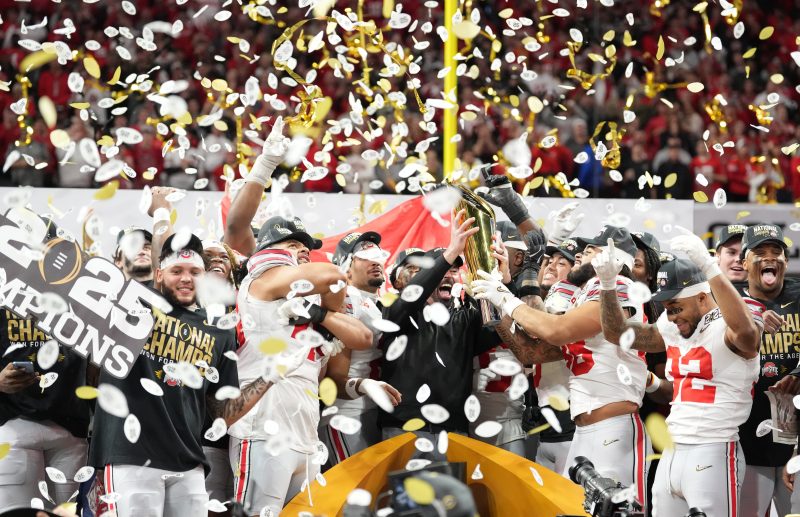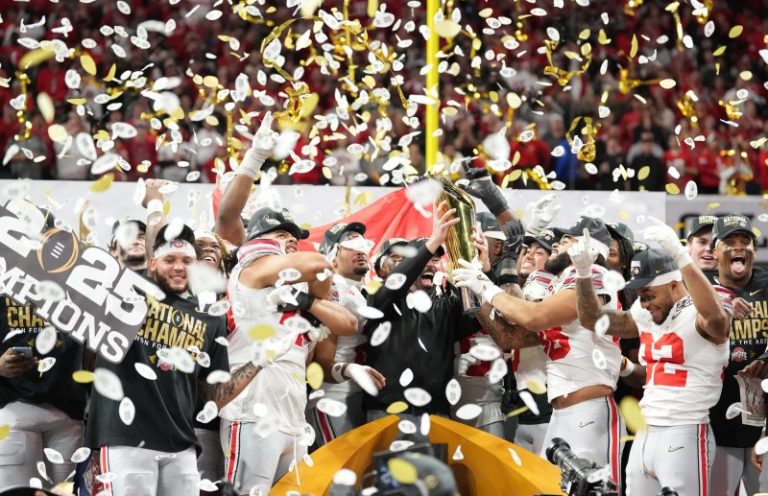
- A mock College Football Playoff selection process revealed the debates are often driven by tribal instincts.
- The human element remains a significant and unavoidable factor in the selection process.
- Arguments used to support one team were often contradicted when discussing another.
LAS COLINAS, TX — We’ve been told over and over that sport mirrors society.
You have no idea how much until you sit in on a College Football Playoff mock voting process.
“Not as easy as it looks, right?” Rich Clark, executive director of the College Football Playoff says Thursday, Sept. 18, midway through this abbreviated white knuckle ride that’s just for funsies — just an opportunity for 14 members of the media to get a glimpse into how this process unfolds on a weekly basis every November.
The news of this day: Alabama was the last team in the field. Not SMU.
Let the whining, bickering and swearing begin.
College Football Playoff selections follow tribal instincts
You want sport mirroring society? Open any social media app on the magic black box that’s hermetically sealed to your hand, and welcome to the world of “you have no idea what you’re talking about.”
The human condition, everyone, is undefeated.
Doesn’t matter how many selection committee members are used (13 for the real committee), or how many unique metrics attempt to steer those members into a logical conversation about value and worth, the discussion invariably returns to tribal instincts.
I’m right, you’re wrong, and you sure as hell aren’t pushing me off my spot.
For this exercise, we didn’t use the new CFP strength of schedule metrics for 2025 intended to push the committee to giving greater consideration to those who play difficult schedules, and those who don’t.
But after this four-hour process that typically takes 16, I’m not sure it’s going to matter.
The same arguments that worked for one team were used against others. The same metrics that strengthened one team, were pretzeled into two-way logic that couldn’t be transposed to benefit another.
Yes, I’m looking at you, Indiana.
Indiana remains challenge in College Football Playoff debate
Apparently Indiana can only play who they can play on their schedule, and it doesn’t matter that it included all of two games against teams with winning records — one that humiliated the Hoosiers.
Doesn’t matter that the plucky Hoosiers paid Louisville $1 million to get out of playing the Cardinals and added Western Illinois from the Championship Subdivision, further weakening their schedule. I mean, who among us wouldn’t want to get out of playing big, bad Louisville?
But that was just the beginning of the oxymoron of a day, a process that – I have no doubt – plays out in realtime with the real committee.
Wins are everything, and losses are damning. Unless, that is, a win in the ACC championship game – for a flipping conference championship! – isn’t such a big deal if it impacts SMU’s body of work.
Or Ohio State winning on the road at Penn State is negated by — I’m swear I’m not making this up — the Buckeyes losing to Michigan.
Those were the arguments being made over and over in this four-hour facsimile of the real thing. And I promise you, those same arguments are made by the real committee.
And that’s the beauty of this perfectly imperfect sport.
Human element will always be part of college football
If I wanted homogenized and antiseptic football, I’d watch the NFL. You wear these uniforms on these Sundays, and play these division teams and rotate annually through these teams based on their records from the previous season — and we’ll eventually get to a 14-team playoff where an 8-9 record can win a division and get you a home playoff game.
I’m going to puke.
I’d much rather deal with the authenticity of crazy, where the sport of arguing plays out on a weekly basis and nothing makes sense — other than the reality that some team, somewhere, will get screwed in the process.
Florida State and Georgia in 2023, Alabama and Ole Miss in 2024, and Texas A&M in 2020 are just at front of mind. There are more mind-numbing mistakes by the CFP committee, or the Bowl Championship Series computers or decades ago by backroom deals with powerful bowl executives.
The arguments and mental gymnastics were as intense and everlasting then as they are now. Only the process has changed.
This time it begins with the top 30 teams, and is eventually winnowed to 25 by a painstaking process that allows for multiple bites at the apple. Because who really knows what they’re doing?
It’s a beauty pageant of a demolition derby, and no team is safe from the carnage. Because no matter how good it looks, there’s always someone who sees the warts.
And you better believe they’re going to dig in and push forward, and not be moved.
Early in the process, Clark used an anecdote from his stellar career in the Air Force (he retired as a lieutenant general) to explain the unique foundation of the CFP selection committee. No matter how many drones or how much artificial intelligence and robots are used in war fighting to eliminate the unknown, at the end of the day, war is a human endeavor.
You can lead a CFP selection committee horse to water, but they won’t all drink it the same way. Or something like that.
“Too much of what happens after the fact enters with the human element,” Clark said.
And the human condition, everyone, is undefeated.
Matt Hayes is the senior national college football writer for USA TODAY Sports Network. Follow him on X at @MattHayesCFB.

